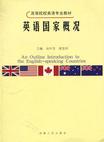英语国家概况
2008-6
河南人民出版社
岳中生,张发祥 主编
408
528000
本书共分五部分26章,以英国和美国为主,兼顾加拿大、澳大利亚和新西兰等英语国家的社会和文化知识,内容包括主要英语国家的地理、历史、政治、经济、文学、科技、教育、宗教、大众传媒、社会生活和文化传统等,突出历史、政治和经济。本书内容力求客观、翔实、全面、实用,具有可教性和可比性,以利于教学组织和比较教学。 本教材是关于主要英语国家社会和文化概况的教科书,旨在帮助英语专业学生和其他英语学习者了解、学习和掌握这些国家的社会和文化知识,提高英语水平,提升跨文化交际意识和能力。
Volume One Britain Chapter One British Geography Section One General Survey Section Two Population and Languages Section Three Major Cities Section Four Mountains, Lakes and Rivers Section Five Natural Resources Section Six Climate and Weather Chapter Two British History Section One Early British History Section Two The Growth of Feudalism Section Three The Growth of Capitalism Section Four Britain and Two World Wars Section Five Britain after World War Ⅱ Chapter Three Political System Section One The Constitutional Monarchy Section Two Constitution Section Three Parliament Section Four Cabinet, Prime Minister and Administration Section Five Political Parties and Election Section Six The Judicial System Section Seven Local Governments Section Eight Mass Organization Chapter Four National Economy Section One General Survey Section Two Industry Section Three Agriculture Section Four Foreign Trade Section Five Work, Money and Tax Chapter Five Science, Literature and Arts Section One Science Section Two Literature Section Three Arts Chapter Six Education Chapter Seven Mass Media and EntertainmentVolume Two America Chapter One American Geography Section One Geographic Position Section Two Mountains, Rivers and Lakes Section Three Geographical Regions Section Four Climate Section Five Population Section Six Natural Resources Chapter Two American History Section One Early American History Section Two The War of Independence Section Three The Civil War Section Four The Rise of American Imperialism Section Five America and World War Ⅰ Section Six America and World War Ⅱ Section Seven America towards the 21th Century Section Eight America in the 21th Century Chapter Three Political System Section One The Constitution Section Two The President Section Three The Congress Section Four Government Section Five The Judiciary Section Six The Two-Party System and the Election Chapter Four National Economy Section One General Survey Section Two Industry Section Three Agriculture Section Four Transportation Section Five Foreign Trade Section Six Banking and Finance Chapter Five American Education Chapter Six Science and Culture Section One Science Section Two Literature Section Three Arts Section Four Religion Section Five Social Life Chapter Seven Mass Media and Entertainment Section One Mass Media Section Two Sports Section Three Holidays and FestivalsVolume Three Canada Chapter One Land and People Section One Geographical Regions Section Two Natural Resources Section Three People Chapter Two Canadian History Chapter Three Political System Section One The Constitution Section Two Governmrnts Section Three Prime Ministers Section Four Political Parties Section Five Foreign Relations Section Six The Separatist Issue in Quebec Chapter Four National Economy Section One Economic Management and Problems Section Two Agriculture Section Three Manufacturing Industry Section Four Service Industry Section Five The Canada-US Free Trade Agreement Chapter Five Society and Culture Section One Society Section Two Culture Section Three LiteratureVolume Four Australia Chapter One Land, People and History Section One Land Section Two People Section Three History Chapter Two Political System Section One States and Territories Section Two Government Section Three Foreign Relations Chapter Three National Economy Section One Mining and Energy Section Two Trade Section Three Agriculture and Fisheries Section Four Manufacturing Industry Section Five Service Chapter Four Culture and Social Life Section One Education Section Two Culture Section Three Health Care Section Four Social ServicesVolume Five New Zealand Chapter One General Survey Chapter Two Land, People andHistory Section One Land Section Two Plants and Animals Section Three People Section Four History Chapter Three Government, Economy and Culture Section One Government Section Two Economy Section Three Education and CultureBibliography
In March 1982, a war between Britain and Argentina broke out, when thenational flag of Argentina was raised on the Islands. After a fierce fighting of over one month, backed by world opinion, Britain finally won. Argentinasurrendered. It has been the largest battle in the Atlantic since the Second World War. Both suffered and were damaged heavily. But victory satisfied the nationalpride of the British as if it were still a Great Power. After the Opium War of 1840, China was forced to sign the Treaty of Nanking in which Hong K0ng was ceded to Britain. In 1984 an agreement wassigned between Britain and the People's Republic of China on the fortune of HongKong. Under the Sino-British Joint Declaration, which was ratified by the twogovernments in 1985, Britain is responsible for the administration of Hong Konguntil June 30, 1997. Hong Kong would then become a Special AdministrativeRegion (SAR) of China, but its capitalist system and lifestyle can remainunchanged for at least 50 years. With the exception of foreign affairs and defense,the Hong Kong SAR can enjoy a high degree of autonomy, and its governmentand legislature should be composed of Hong Kong people. In November 1990, John Major succeeded the Prime Minister. Like theformer Conservative one, the Major government believed that only firm basis for lasting economic growth and secure employment was sustainable for low in flation. For the next few years, it set itself the objective of keeping underling in flation. The government's economic policy was set in the context of a mediumterm financial strategy. Firm monetary and fiscal policies were designed to de featin flation. With lower inflation and interest rates and an increase in export as the world economy recovers,the government expected to see a resumption of economic growth, although the timing was uncertain. In 1990, when Iraq committed aggression on Kuwait, the Gulf War broke out, Britain contributed personnel to the UN observer mission established tomonitor a demilitarized zone between Iraq and Kuwait, following the expulsion of Iraqi forces from Kuwait early in 1991, and sent observers to Western Sahara to participate in the referendum monitoring operation established there by the UN. With the Soviet Union dissolving at the end of 1991 and the radical changes in Eastern and Central Europe, the Cold War ended. Britain and its allies acknowledged that the threat of a full-scale attack on all NATO's European fronts has been removed. However, Britain believed that its security could be best protected by the continuing maintenance of collective defense with its NATO. ……

内容还可以,慢慢看吧!
纸张的质量一般,但内容还可以,是老师推荐的
跟学校教材一样。就是书有点旧